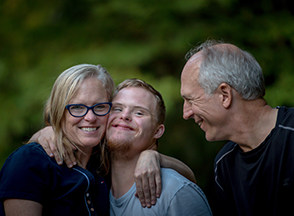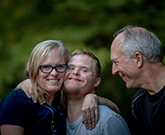The Transition to Adulthood: Helping Your Child with Disabilities

Over the past 50 years, the transition from adolescence to adulthood has changed greatly in the United States. It is a slower process for the majority of today’s youth, with many remaining dependent on their parents for money, housing, and other help well into their twenties. This transition can be especially difficult for those with physical or mental disabilities.
The education system has a key role to play in assisting families with this process.
Transition planning, which prepares students for life after high school, can really make the difference in helping youth move into independence. Awareness of current policies and strategies regarding transition planning can better prepare parents to help their children with disabilities. As parents know all too well, many services provided to children and teens come to an end at a certain age. This makes achieving independence all the more critical.
Policies Affecting the Transition of Students with Disabilities
The Education of All Handicapped Children Act (EAHCA) was the first policy created to address the needs of children with disabilities in the US. In 1990, it was revised and renamed to the Individuals with Disabilities Education Act (IDEA). Both of these acts required that Individualized Education Programs (IEPs) include transition planning and that parents be involved throughout the process.
The latest changes to IDEA resulted in the Individuals with Disabilities Education Improvement Act (IDEIA) of 2004. This new law requires that transition planning begin by age 16, that students are involved in this planning, and that clear goals are set for the student to achieve after high school.
Learning from Research and the Real World
According to research, the following strategies can help students during the transition planning process:
- Involving the students, parents, and family
- Building relationships between the student and his or her family and the school
- Designing a curriculum focusing on life/job skills and work experiences
- Creating goals that incorporate the student’s interests and include a plan for measuring progress
Unfortunately, these strategies are not always used during the transition planning process. In a 2010 study, students and parents shared their frustration about many aspects of the process, including the failure of schools to involve students in the process, a lack of support/communication from schools, parents’ constant need to stick up for their children, and parents’ desire for their children to be more engaged in their own lives. At the same time, they emphasized the importance of support from many sources and an effective transition curriculum (including career planning, job/life skills, etc.)
Instead of waiting for policies to be enforced or school systems to do a better job, parents can take steps to help improve the transition planning process. First, they should aim for early and continued involvement in their children’s transition planning. Additionally, they should form and maintain a close relationship with the school staff. Lastly, it’s a good idea to research the different laws and policies affecting children and adults with disabilities, as well as to learn about transition planning and resources available within the community.
Helping Children to Move Forward
The transition to adulthood doesn’t magically happen overnight—today, it is a process that takes more time for youth and requires greater guidance from parents. This is especially true for teenagers with disabilities, as they face even greater challenges in academics, employment, and independent living. Unfortunately, students and their parents often experience difficulties during the transition planning process at school. Parents can take a proactive approach by getting involved with their children’s education planning as early as possible and asking questions about transition planning when their child begins high school. This parental support and engagement can make a big difference for students with disabilities as they transition to adulthood.
By Krista Hunt, M.S. candidate, Department of Family, Youth and Community Sciences, University of Florida, and Carol Church, lead writer, SMART Couples, Department of Family, Youth and Community Sciences, University of Florida
References
Hetherington, S. A., Durant-Jones, L., Johnson, K., Nolan, K., Smith, E., Taylor-Brown, S., & Tuttle, J. (2010). The lived experiences of adolescents with disabilities and their parents in transition planning. Focus on Autism and Other Developmental Disabilities, 25(3), 163-172. doi:10.1177/1088357610373760
Osgood, D. W., Foster, E. M., & Courtney, M. E. (2010). Vulnerable populations and the transition to adulthood. The Future of Children, 20(1), 209-229. doi:10.1353/foc.0.0047
Settersten, R. A., & Ray, B. (2010). What's going on with young people today? The long and twisting path to adulthood. The Future of Children, 20(1), 19-41. doi:10.1353/foc.0.0044
Reviewed by: Leslie Hamilton and Sheyla Pena
Return to Topic: Advocating For Your Child


